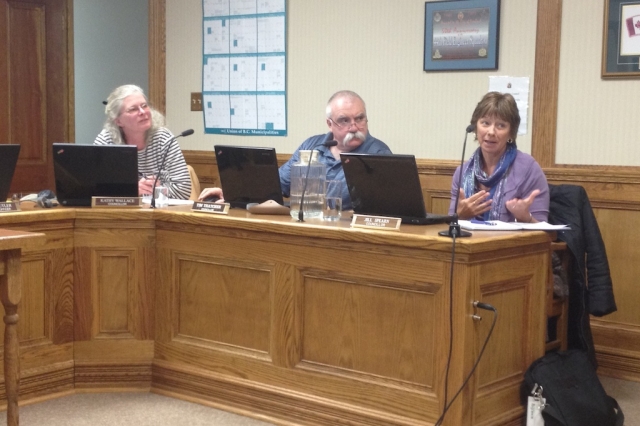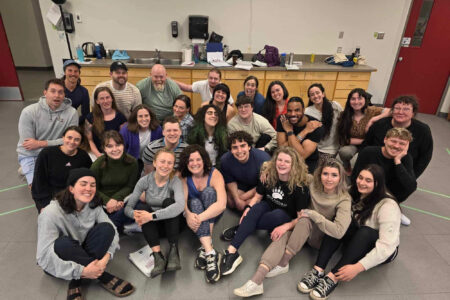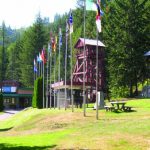Tempers flare as Columbia-Washington parking controversy continues
Council has deferred decisions on the final design for the upcoming Columbia-Washington renovation until all the tender documents from prospective contractors are received and council can debate the merits of various plans with “hard numbers” in hand.
The tender deadline was extended beyond the original closing date of Mar. 27 to Apr. 2. CAO Victor Kumar explained that most of the contractors required more time, he suspected, to coordinate with subcontractors.
The Mar. 26 council meeting included a delegation from the Chamber of Commerce to present the results of their recent survey of downtown businesses on this issue. Businesses are bracing for lost revenues during construction that will start this May and run for five months—peak season for several businesses.
Three people also commented at the public input session to oppose parallel-parking and the widened sidewalk in the design.
John Greene, owner of Rossland Hardware, complained that signatures on the letter presented to council two weeks ago in favour of the pedestrian friendly redesign were all by fit and able-bodied residents, and “none of them have a downtown business.”
He contrasted the 24 signatures on the letter that former mayor Bill Profili presented to council with the petition he and other downtown business owners presented to customers at Ferraros three weeks ago: “600 signatures were obtained in opposition in just two days.”
Greene asked about cost and convenience. Some of the additional parking spaces cited in the design are currently used by downtown business owners and employees—”Where are these people going to park?” he asked, adding, “Recent incidences of illegal parking in front of our store indicate that we will need a full-time bylaw enforcement officer.”
Then Greene proposed a challenge: He said he would stand in front of the post office with a petition in favour of parallel parking and a petition against. “If I don’t get ten-to-one against parallel parking, I will personally paint the parallel parking lines.”
“This is not Nelson or any other place. The downtown situation in Rossland is unique. Let’s preserve the parking and the heritage of our wide main street,” Greene said, upset with the process at council. “You, the leaders, the people around this table, have not been listening. Clearly this is not democracy.”
Lisa Wegner, as a “formal proxy” for Legacy Gift Shop owner Roseanne Chobanuk who could not attend the meeting, spoke against parallel parking: “Her main concern is the preservation of the footprint of Columbia Ave,” Wegner said, “and to focus on enhancing the east and west ends of downtown.”
Adding focus to the periphery was a strong theme in the results of the business questionnaire administered by Renee Clark, executive director of the Chamber of Commerce.
Clark noted, “Currently, streetscape features put a lot of focus on the “feature block” [between Queen and Washington], but a lot of the empty storefronts are on the two outer blocks. Owners on these blocks want to create a focus on the outer edges of downtown.”
Wegner added Chobanuk’s concerns about the chamber questionnaire, in particular a question that asked businesses if they preferred “a loss of 25 parking stalls or a loss of 15 stalls,” from the current 108 stalls on Columbia Ave.
Wegner quipped: “You’re going to get a big dog or a little dog, but either way you’re going to get a dog. And I don’t even want a dog!”
Coun. Kathy Moore noted that the city has failed to communicate important issues to the public, for example Ministry of Transportation (MOTI) requirements that will not permit Rossland to reassemble Columbia Ave. in its present form.
Regardless of the final design, due to MOTI requirements on stall widths, lane widths, and lines-of-sight, existing sidewalks will have to be made narrower—except where parallel parking will permit them to be wider. Even with diagonal parking throughout the strip, 15 parking stalls will be lost.
Clark’s report supported Moore’s perception of failed communication. Businesses in general felt “there was always an opportunity to comment and provide feedback,” but they were concerned that the city hadn’t made changes based on this feedback. Clark reported that of 38 questionnaires handed to businesses on the strip, 21 answered against parallel parking and 5 responded in favour.
Businesses particularly wanted assurance that communication would improve during construction, preferably with weekly updates. Last summer Moore had lobbied hard for the city to create a community committee to liaise between the public and the designers, city, and contractors, but her motion failed.
“It’s too bad we didn’t get our group off the ground,” Moore said. “There should have been more dialogue back and forth—it’s an important thing that we missed.”
Mayor Greg Granstrom took issue with the perception, noting “umpteen public input sessions.” He also used Monday’s meeting to launch a new “task force” to communicate regularly with the public about the state of the Columbia-Washington project. The task force will include the mayor, two councillors, city staff, the engineers and architects, and the contractor.
Bill Micklethwaite was the third to speak to council on Monday as a “concerned citizen.”
“I absolutely agree with widespread opposition to the imposition of what appears to be expensive parallel parking to create a wider sidewalk that will be nothing but useless and a burden for the greater part of the year,” Micklethwaite said.
ISL Engingeering has provided estimates that indicate there should be no significant difference between the construction costs of a wider sidewalk versus those for a wider street.
“I’m concerned the city is ignoring, or apparently ignoring, a lot of public input,” Micklethwaite continued. “A sixth of the population has said explicitly that they oppose what is going ahead. What more can we do?”
“Tonight there was supposed to be a committee-of-the-whole to discuss this project, but now it will be put off into the indefinite future. The optics are that this is a stall, to put it off to some point in future, at which point it will be impossible to make any changes. It looks like this is meant to be a staff coup,” Micklethwaite said.
“Who matters? The staff or the citizens? This is meant to be a democracy. Who’s running city hall? You? The council? Or a staff who appears to be very arrogant in this matter?” he finished.
The mayor replied to Micklethwaite, “The reason we have this public input period is for the exact fact that this is a democracy. We’re waiting for some hard numbers so we can make some hard decisions. There is certainly no need for this council to sit and have a committee-of-the-whole meeting without firm numbers.”
At that point council recessed to a committee-of-the-whole in which council agreed unanimously that no decision could be made until the tender was closed and bids were known.
Coun. Jill Spearn also took a moment to respond to Micklethwaite’s allegations: “I take offense to that. I strongly believe that we’re not stalling. We’re trying to do things with due diligence,” she said, making clear that the “biggest pending decision is parallel parking.”
Later Spearn added, “The downtown project is the most important thing at this point in time. It deserves tons of input and a robust group [referring to the new task force] to make sure this goes as smooth as ice.”
Clark summarized the rest of the findings of her questionnaire: businesses generally liked the design’s pedestrian crossings, increased off-street parking, new pavement and concrete, bump outs and traffic calming features, landscaping features, and the improvement of downtown’s “look.”
On the other hand, they’re concerned by the prospect of lost revenues during construction—accepting “short term pain for long term gain,” Clark said—due to interrupted traffic flow, dust, noise, and other inconveniences.
To counter these problems, businesses hope the construction phase will include safe pedestrian access to store fronts, handicap parking stalls, a tight construction schedule to limit delays, visible signage to direct people to alternative parking, and a strong marketing campaign for the whole town to remind visitors that Rossland remains “open for business.”
In the long term, Clark said, “our hope is that our community remains attractive and will attract even more businesses to fill up vacant spots.”
Coun. Cary Fisher thanked Clark for her efforts, noting that it hit the “lightning rod issues”—namely, parking—but he noted the focus on the parallel parking issue could detract from the bigger picture.
He said, “We might be losing sight of the fact that we can use this opportunity to make things better.”
























